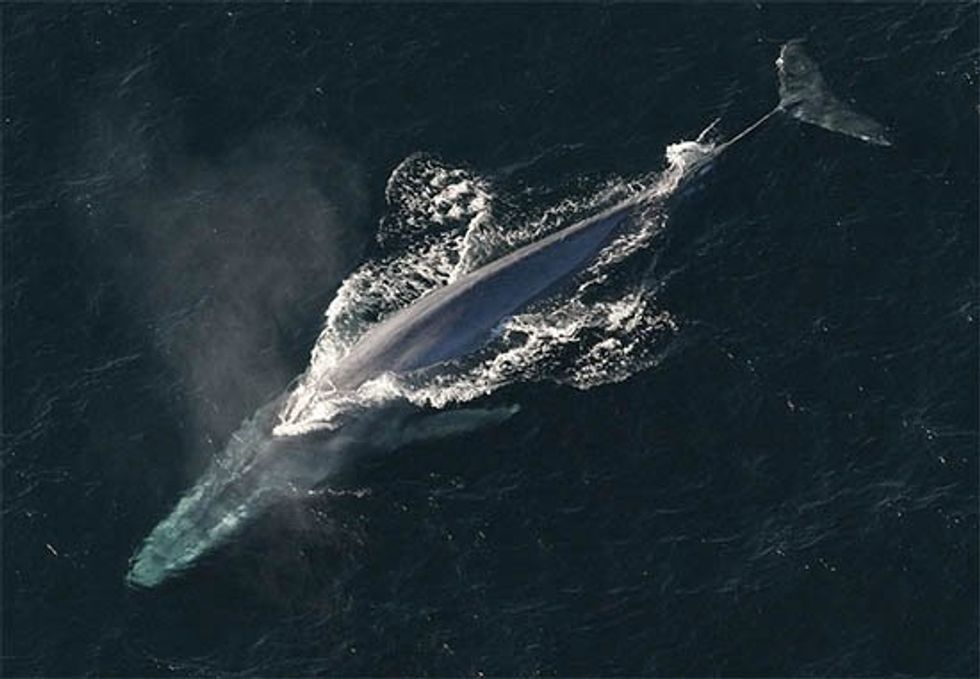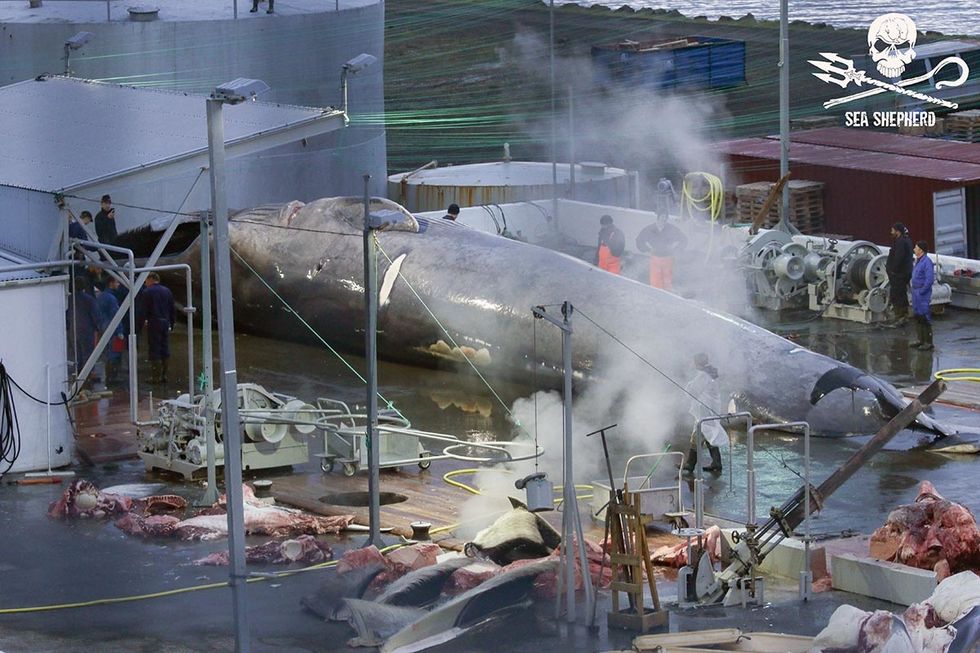Kristjan Loftsson has a lot of money, which seems to make him think it's okay for him to do whatever he wants. This summer, for instance, he plans killing 150 whales. His whaling vessel has already taken the life of one blue/fin whale hybrid.
The killing of both blue whales and fin whales is expressly forbidden by animal protection laws. Hybrids, however, are fair game in the whaling world, and that's what Loftsson claims he's brought in. The creature was killed with a harpoon cannon.

Some scientists expressed doubts that the whale was actually a hybrid. If the whale was a pure-bred blue whale, then Loftsson's actions are highly illegal. Dr Phillip Clapham from the NOAA Alaska Fisheries Science Centre isn't sure what might have made the men on the whaling boat think their prey was a cross-breed:
While I can't entirely rule out the possibility that this is a hybrid, I don't see any characteristics that would suggest that.
From the photos, it has all the characteristics of a blue whale; given that – notably the coloration pattern – there is almost no possibility that an experienced observer would have misidentified it as anything else at sea.

Iceland's Marine Research Institute did a series of tests on the whale's body and determined it was, in fact, a hybrid. International conventions protect hybrids too, however, so what Loftsson has done may still put him in legal danger.

Sigursteinn Masson from the International Fund for Animal Welfare in Iceland believes whaling should be banned altogether, for fear of harming endangered species:
The killing of a blue-fin whale hybrid demonstrates the difficulty for whalers at sea to identify which species they are pursuing. The result is that a rare and protected species has suffered as collateral damage from a cruel, unnecessary and increasingly unpopular hunt.
He went on:
Now that the evidence has been confirmed, we once again call for an immediate and permanent end to this whaling to prevent further harm to these endangered species, which not only play a crucial role within the marine ecosystem, but also embody such a rich national and cultural heritage as well.
IFAW has worked alongside Icelanders for many years to promote responsible whale watching, rather than whale killing.
This is better for whales, Iceland's tourism industry and its international reputation.
The scandal has galvanized whaling industry opponents, and some called out Loftsson directly. Others contacted the Icelandic Prime Minister.
The whale was harvested for its meat, while the animal's blubber and bones were deposited carelessly on a beach. Loftsson is determined to take his boat back on the water and kill 149 more whales before the summer is over, despite criticisms from every corner of the globe.
Only 1% of Icelanders eat whale meat regularly, but hopefully someday we can get that down to 0%. According to Whale and Dolphin Conservation (WDC), which chronicles its efforts to stop the harvesting of the minke whale, a type of baleen whale:
Almost all the meat from minke whales slaughtered in Icelandic waters is eaten by visitors to the country under the mistaken belief that this is somehow a 'traditional' dish. In fact most Icelanders never eat whale meat and tourist demand just encourages further cruel hunts...
In 2009, a staggering 40% of tourists visiting Iceland admitted that they had eaten whale meat. By 2014, that figure was reduced to 18% of visitors, thanks to a major outreach campaign by WDC and other organisations...
WDC asks all tourists thinking of visiting Iceland to make a positive choice and avoid eating whale meat. Whilst the number of venues offering the meat has declined in recent years thanks to greater awareness, minke whale meat is still widely available in restaurants and supermarkets both in Reykjavik, the capital and elsewhere. Whale meat is also widely offered as part of a 'traditional buffet' offered to tourists at certain venues but may not be labelled as such, so extra care should be taken!
Whale watching is massively popular in Iceland and the whale watch industry is worth an estimated ten times more than whaling - yet we still receive reports of tourists walking off whale watching vessels and straight into restaurants that serve whale meat. WDC is positively encouraging tourists to this amazing country to get out to see the whales with a responsible, local whale watching operator and asks that visitors consider the inhumane way in which these magnificent and intelligent creatures are killed before they are served up, and the impact that whaling has on the whale watching industry.
H/T - Unilad, Indy 100








 @PreetBharara/X
@PreetBharara/X @RepBrendanBoyle/X
@RepBrendanBoyle/X @twesq/Bluesky
@twesq/Bluesky @christopherharris/Bluesky
@christopherharris/Bluesky @evangelinewarren/X
@evangelinewarren/X






 @FrankC164/X
@FrankC164/X
 AMC
AMC